Bundesliga Tactics Talk: Round 33
By far the most interesting result of last weekend's action - Köln's surprise comeback win over Union Berlin - receives extended coverage below. Köln and Union are joined on the tactics board this week by Bayern, Wolfsburg, Leipzig, Bremen, Hoffenheim, Freiburg, Frankfurt, Leverkusen, and Bochum.
We'll delve into the races for Europe, the quest to avoid the drop, and engage in our trademark fun with linguistics as well in what will absolutely be the second-to-last version of this long-running column. Talking points about as another season on the world's best footballing beat draws to a close.

| Marvin Schwäbe | Sandro Halank CC BY-SA 4.0 |
Bundesliga Tactical Banter: Round 33
Friday's "non-compete"
Takeaways from Friday night's "curtain-raiser" remain rather scant. Sebastian Hoeneß' sensational Stuttgart set an early tone against a flaccid Augsburg side most of us projected to pick up zero more points this season a couple of weeks back. Relegation avoided, Jess Thorup's FCA happen to be one of those Bundesliga sides who truly know better than to make a run at Europe at this point. This manifested itself in some of the zany experimental tactics Thorup has been using in recent fixtures. The Fuggerstädter trainer at least had the decency to ditch his wretched back-three in the latest match and return to his regular 4-4-2 diamond. It made no difference, of course; not against a sovereign and superior Stuttgart intent on settling the affair early.
VfB winger Chris Führich found himself on the wrong side of lady luck on several occasions. Surging midfielder Angelo Stiller came forward to bid for a goal himself on several occasions. Silas looked very lively off the bench yet again. The Congo DR international was also unlucky not to score. One can hardly wait to see him in action next year, irrespective of for whom the African mega-talent receives a chance to play for. In general, one hopes that club management can keep as much of the crew together as possible over the summer. It shapes up to be a long offseason full of outgoing transfer rumors. The columnist already engages in some preemptive grinding of his teeth.
The Swabian sensations - in their present form - simply count as a joy to watch. Those of us tuned into the Friday night affair felt we deserved slightly more than just the one goal. At least the lone tally proved an absolute gem. Enzo Millot's defense-splitting launch towards Guirassy, followed up by a super-slick takedown and finish, sent shivers down one's spine. Beyond that, the fact that the Württembergers put their opponents under pressure with almost uninterrupted rolling counterattacks was entertaining enough. There's an indefatigable spirit inherent in this team. More goals could have been scored, but those lightning-strike counters ensured that the "no contest" kept one's interest.
Saturday's "non-compete"
Right from the onset, one could tell that the Saturday night Top-Spiel between Dortmund and Mainz wasn't set to be much of a competitive encounter either. Two Mainzer strikes off the goal-frame were rapidly followed up by three goals in quick succession. Some brief amusement over the fact that Dortmund's "Alupakt" remained in force reigned for a short time. Once Jae-Sung Lee sewed up his scorer's brace on the 3-0 in the 23rd minute, however, it immediately became apparent that the remaining two-thirds of the match would have little to offer. A fairly early capitulation from Dortmund. Some may make the case that BVB trainer Edin Terzic's decision to rest so many key players constituted a surrender before a ball had even been kicked.
Mistakes from the non-regulars made it all too easy for the Rheinhessen hosts to throw a lid on this one quickly. Leandro Barreiro's 12th minute 1-0 came courtesy of a horribly sloppy pass out of the back from Mateu Morey. The choice to tap back-up keeper Alexander Meyer for a cold start then cropped up to sting Terzic in the 19th. Lee was gifted his first goal via a pass from the net-minder that left one rubbing one's eyes in disbelief. Without taking anything away from Brajan Gruda's superb dribbling on the third goal (the young German phenom genuinely impressed throughout), Terzic's shellshocked squad offered up next-to-no marking resistance on the tally that ultimately broke them. One must mention such things before explicitly praising the FSV.
The win extends Mainz's league unbeaten run to eight games and moves them out of the relegation zone for the first time this season. Another nice escape from the "Urban Pfälzer". They did it again another Danish trainer named Bo. Clubs that cycle through three head-coaches in a single campaign rarely manage to pull it off. Props to the administrative team of Christian Heidel and Martin Schmidt for making the right moves. Nadiem Amiri, looking beastly again on set pieces, can be considered the most influential January transfer in the league. Johnny Burkardt's comeback and Henriksen's energy-infusion really helped lift this club. While not officially safe from the drop, prospects for a safety-securing win against Wolfsburg next week appear very good.
The "Spiegel Specials": Round 33
Bayern-Wolfsburg (2:1, 2:0)
We'll segue directly into Wolfsburg with the first of our "Spiegel Specials". Like the first two matches already covered, the two teams involved in Sunday afternoon's "middle match" settled into "gentlemen's agreement" football for long stretches in what amounted to a "dead-rubber". No sense in risking injury when the stakes are so low. Wolfsburg - one of the well below average teams suddenly considered European contenders thanks to next year's Champions League re-format - unsurprisingly didn't play like a team with Europe in their sights. A premature step up hurts a team in disarray more than it helps.
Fully understandable.
In any event, unlike in the Hin-runde, we don't have a tactical masterclass to cover here. FCB trainer Thomas Tuchel rolled out the "C-Level" XI in his uncelebrated and unceremonious final home fixture in charge of the German giants. Eight changes to the side that lined up against Real in the Champions' League led to two interesting experimental deployments. Bryan Zaragoza and Lovro Zvonarek were given Bundesliga debuts as wingers. Mathys Tel earned a rare start as a solo lead-striker; which is actually his natural position. It's totally fair to say that everything shook out as Tuchel had initially envisioned.
Lineup—FCB—Match 33 (4-2-3-1)
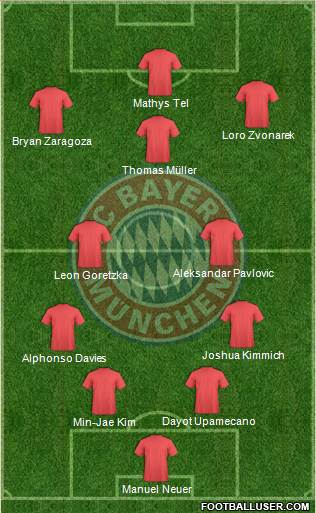
We were pretty much done here before the opening quarter-of-an-hour elapsed. Zvonarek, set up by Alphonso Davies, netted his maiden Bundesliga goal less than five minutes into his first start. A bad ball loss from VfL defender Maxence Lacroix enabled both Zvonarek and Zaragoza to set up Leon Goretzka's 2-0 less than ten minutes later. Zaragoza nearly registered his first Bundesliga goal in the 18th on a tally scratched off due to a tight offside call involving Thomas Müller. One honestly beheld almost nothing noteworthy after that.
How scrambled are Hasenhüttl's tactics?
Wolfsburg's new Austrian trainer continues to confuse. Two rounds back against Freiburg, he debuted with a back-five that couldn't maintain its shape in the opening half. A triple substitution at the break yielded another mess of an arrangement that occasionally worked as a back-five and sometimes as a back-four. Hasenhüttl's left-hand side invariably remains hard to read. American attacker Kevin Paredes, Danish fullback/wingback Joakim Maehle, and German midfielder/fullback Ridle Baku (admittedly all versatile players) never seem to occupy set positions.
Having taken some time to try and sort it all out, the columnist currently leans toward the conclusion that Hasenhüttl is simply one of those coaches who insists that his squad always keep a different shape depending on whether they're on or off the ball. In principle, one sees some accents of most football matches. The new VfL trainer appears to be one of those very strict about implementing this. One begins to discern this in his body language on the sidelines. Having just let one over-tinkering and over-controlling trainer go in Niko Kovac, one wonders how the team feels about this.
It looked as if the match-plan against Bayern was to work as a 3-5-2 whenever in possession. Off the ball, a fairly deep-seated 4-4-2 took shape. Paredes and Maehle were definitely called upon to head back and engage in defensive work. The defensive shape hardly facilitated much of a press. Bayern's two young wingers charged forward with confidence and got into useful spaces. After the third disallowed goal, things got even stranger. Hasenhüttl ditched his initial approach without making any personnel changes.
Lineup—WOB—Match 33 (4-4-2)
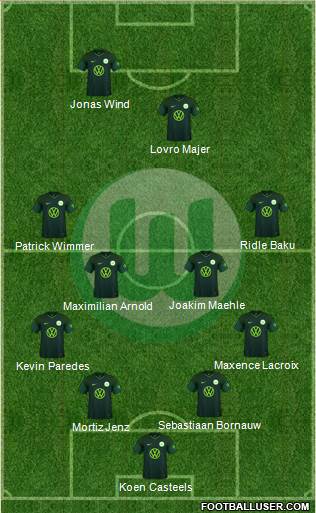
The author's best guess:
Lineup—WOB—20th minute (5-4-1)
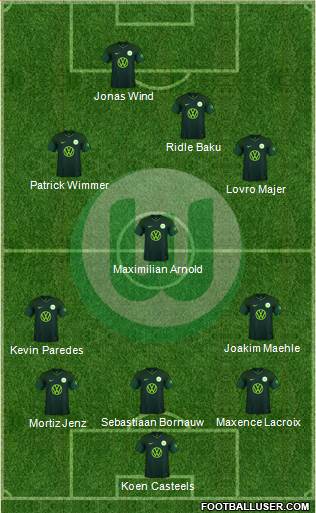
The plan seemed to involve a set "Anhängende Spitze" (a German term for a type of service striker/anchoring short-striker deployment), but the columnist couldn't really tell if it was supposed to be Baku or Lovro Majer. Sometimes it looked like Patrick Wimmer held the role This held true throughout the second half as well after Jakob Kaminski relieved Wimmer. Perhaps it was meant to be a rotative set-up. If Hasenhüttl had been more familiar and established with his team, that would be perfectly fine. For someone one the job for such a short time, however, it smacks of haughtiness.
Germany's green company team responded to all of this by producing a grand total of 0.22 xG over the course of 90 minutes. Tuchel added insult to injury by subbing third-choice keeper Daniel Peretz in for the final 15 minutes. Some "gentleman's agreement" football in place or not, throwing a cold and inexperienced keeper in during a match in which one only holds a two-goal lead counts as a pretty flagrant slap in the face. Hasenhüttl looked red as a beet after the full-time whistle. Tuchel like happily works his way back to the Premiership.
Hasenhüttl looks stuck in career hell.
Prognosis: Mainz with favorable odds
Safe money belongs on Mainz against Hasenhüttl's crew next weekend. After that, the previously forecast "End to the WOB Wobble" can begin germinating. By this time next year, we'll likely be sining Hasenhüttl's praises. For whatever it's worth, the Austrian is absolutely the best coaching appointment this club made since the departure of his Austrian compatriot Oliver Glasner. That statement should obviously itself by tempered by the fact that the competition - Kovac, Florian Kohfeldt, and Mark van Bommel - wasn't terribly stiff. One trusts this man's mind. He does have some good ideas.
The roster as it exists contains plenty of talent. A company club such as this one possesses much more financial muscle on the transfer market. Marcel Schäfer's departure leaves Sebastian Schindzielorz and Hasenhüttl in charge of squad planning for now. That's not a bad team. It's unsurprising to discover that most of the rumors regarding a new front office executivehave proven without foundation. As much as German clubs frown upon the head-coach assuming managerial duties, Hasenhüttl may be one of those rare exceptions in which his EPL experience helps him in that role.
For now, Mainz can probably prepare to party.
Bremen-Leipzig (1:1, 1:1)
From Wolfsburg, we'll now shift over to VfL Bochum's opponent next week. Bremen are another team that almost seemed to remove themselves from the European discussion on purpose this past round. Marco Rose's German Red Bulls - with not much to play for and potentially facing the loss of their coach next season if squad planning this summer isn't to his liking - looked out of sorts as well in easily the worst overall match of the weekend. In stark contrast to the Hin-runde fixture with the exact same scoreline, lessons to be gleaned from this one were few and far between.
We'll begin with Rose's Saxons first, lined up in one his unsuccessful attempts to ditch his regular 4-2-2-2 for a 3-4-3. Xaver Schlager's loss to injury likely guided the RB trainer's thinking here. Teenage talent Nicolas Seiwald has repeatedly shown that he's not entirely ready to thrive in the standard system. Additional losses such as Xavi Simons (suspension), Benjamin Sesko (sick), and David Raum/Dani Olmo (muscular issues) meant it was as good a time as any to try something different out. This set-up unfortunately played a woeful first half.
Lineup—RBL—Match 33 (3-4-3)
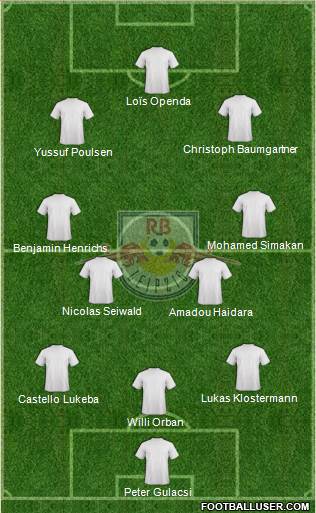
Neither team showed much of any initiative in the opening 20 minutes. SV trainer Werner - who incidentally debuted his 3-4-3 variant against Leipzig in the final match of the 2023 calendar year - again made some subtle tweaks to his basic constellation. The 3-4-3 observed last week against Gladbach was modified so as to move wingbacks Felix Agu and Mitchell Weiser back to a station behind the halfway line whilst according Senne Lynen and Leonardo Bittencourt a chance to operate as eights. Results were mixed.
Lineup—SVW—Match 33 (3-4-3)
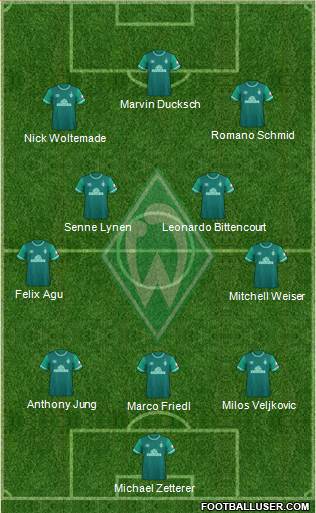
Agu nearly latched onto the attacking trio with solid diagonals. The team forced an own-goal out of Seiwald to take the lead in the 36th. Werder maintained the edge in an optically poor first-half, at least showing some confidence whenever Nick Woltemade and Romano Schmid got touches in the box. Rose had to take Yussuf Poulsen - who later admitted that he had played a terrible game - off for the still-recovering Sesko at the half. Seiwald redeemed himself with a nice whip across for Mohamed Simakan on the play that would result in Sesko's 1-1 in the 61st.
Agu blew the mark on Simakan just prior to the Sesko's equalizer. The whole team essentially tanked in the second 45. The Hanseaten have their newly signed #1 keeper Michael Zetterer to thank for helping them preserve a point. Leipzig surprisingly rebounded without a major system shift and came close to cracking the 2.0 xG mark. Bremen failed to furnish the offensive quality necessary to warrant their surprise status as European contenders. Team (secretly) and Bundesliga lovers (openly) have to be grateful for this.
Prognosis: Bochum with favorable odds
Heiko Butscher's VfL might fancy their chances of taking a point off of Werder at the Weserstadion next week. A draw shall suffice to lift the Revierklub out of danger. Thomas Letsch's 1848ers did precisely that in the final match of the Hin-runde some four months ago. Quite a bit suggests that we'll be discussing yet another 1-1 draw after conclusion of league play. The 3-4-3 that Werner (as predicted) switched to for the current calendar year has gotten the job done and helped Bremen avoid relegation. Bochum nevertheless seem adept enough to take a point off it.
The "Burning Question": Round 33
Are three teams fit for Europe?
Time to - just as we did five weeks ago - take a look at the latest form of the "lower end" European contenders. Though much has changed since then, we are indeed checking up on the exact same three teams. Amid all of the clamor and commotion of which Bundesliga teams can hope to qualify for the Europa and Europa Conference league next year, Freiburg, Frankfurt, and Hoffenheim remain the core trio on the bubble. Results this weekend leave this trio occupying the 6th, 7th, and 8th place in the table. Only Pellegrino Matarazzo's Kraichgauer managed to pick up three points this weekend.
We'll thus begin with the TSG. The Sinsheimers picked up some wind for their sails thanks to Andrej Kramaric's late equalizing strike in the round 32 Leipzig fixture. Hoffenheim then parlayed this momentum in a quick dismantling of lowly Darmstadt. It seems that - after a full season of patchy experiments - Matarazzo has stumbled upon the right set of tactics at precisely the right time. Wout Weghorst's inability forced him to deploy Kramaric farther afield. Marius Bülter has settled into a pseudo-wingback role comfortably. Florian Grillitsch finally figured out how to hit proper long launches "from the deep".
Lineup—TSG—Match 33 (3-4-3)
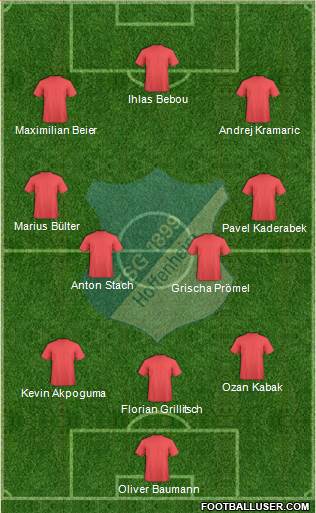
Ihlas Bebou in the right wingback slot is one experiment we've thankfully seen the last one. The Togolese attacker rarely fails when given the opportunity to work his preferred position. Bearing in mind that a 2-0 lead secured in the 6th minute left Darmstadt less than interested in mounting much of a comeback, the entire crew did an impressive job of handling their defensive assignments as a unit. Bülter and Pavel Kaderabek fell back at all the right times in addition to making their presence felt offensively on this day. Many teams would have conceded a consolation goal in a match like this.
Prospects against Bayern?
Realistic considering there will be more squad rotations from Tuchel on the final match-day. Some may recall that the Hin-runde fixture was not so lopsided as the scoreline might suggest. Some more composed finishing from Maximilian Beier might have led to a different result. Beier presently appears to have no real problems with his finishing. That makes a huge difference. The likes of Beier, Bebou, Kaderabek, and highly talented (yet always frustratingly inconsistent) defensive force Ozan Kabak surely stand ready to meet the challenge. One hypothetical shake-out leaves the TSG in the UCL race.
Did Freiburg deserve to win?
A strong start to the final home fixture of Christian Streich's long tenure, combined with a vastly superior second half against visiting Heidenheim, certainly left one with the impression that Freiburg should have picked up three points this weekend. SCF gaffer Streich himself later admitted that thoughts on the seemingly unjust result were the only things occupying his mind as he sat in the dugout after the full-time whistle. Heidenheim's Kevin Sessa converted what felt like the only legitimate scoring chance of the game for the Albogeners. Meanwhile, practically all actors in Streich's lineup missed opportunities.
Lineup—SCF—Match 33 (3-4-3)
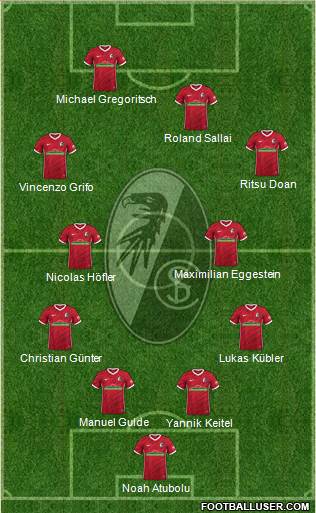
Lead-striker Michael Gregoritsch spurned the first chance in the 16th. Midfielder Maximilian Eggestein - in what was an aberrantly solid match from him - kept things promising on the SCF charge. Gregortisch missed further close-range shots while - a little later on - Gregoritsch's replacement Lucas Höler fluffed his lines on a pair of occasions. Vincenzo Grifo struck the crossbar. Roland Sallai shaved the aluminum with one hit. Goal-scorer Ritsu Doan and the departing Yannik Keitel remained active until the very end. Observers found their thoughts in line with Streich's after the match ended 1-1.
Final xG stats:
xG Freiburg: 1.94, xG Heidenheim: 0.84
Difficult to believe that the Breisgauer didn't bump it up higher after creating chances with almost every approach in the final 20 minutes. The Schwarzwälder were also unlucky to see FCH captain Patrick Mainka inadvertently direct what looked certain to be an own-goal off the post. Heidenheim wouldn't have scored at all were it not for a blackout involving (no surprise) blackout-prone Nicolas Höfler. A little sad to see future Freiburg player Eren Dinkçi collect the assist on Sessa's 38th-minute 1-1.
Prospects against Union Berlin?
Phrew. This team's final opponent opens up one seriously squirmy can-of-worms. About the best one can manage in terms of prediction is that it's highly unlikely to produce the same scoreline as the placid 0-0 affair that the author choose to get out of the way immediately atop the round 17 column. Some thumb-busting downward scrolling is definitely predicted here. Germans honestly won't know who to root for between Union and Freiburg as neutrals maintain plenty of sympathy.
We might as well move on.
What's the latest with Frankfurt?
Meh. More bang-average stuff. A 1-1 draw with Gladbach over the weekend underwhelmed all around. One change to the XI manhandled by Leverkusen last week saw Ansgar Knauff come on for mega screw-up Niels Nkounkou. Dino Toppmöller's previous 4-4-2 turned into a largely toothless 3-4-3. Knauff cut through BMG trainer Gerardo Seoane's unchanged 4-4-2 outfield on several occasions. Mario Götze turned in another impressive performance pulling the midfield strings alongside Ellyes Skhiri. Most of the rest of this didn't work.
Lineup—SGE—Match 33 (3-4-3)
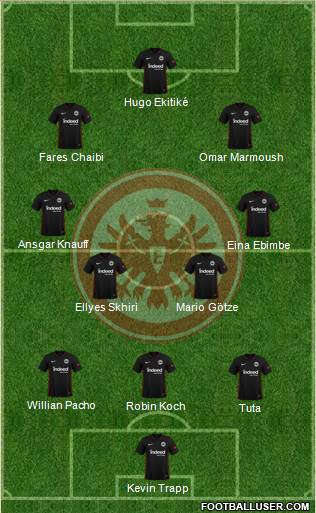
A genuinely odd match from Knauff's axial partner Eric Junior Dina Ebimbe. Gladbach left-railer Joe Scally toasted the Frenchman on Robin Hack's 9th-minute 1-0. Ebimbe then blew a scoring chance at the other end of the pitch in the 17th before redeeming himself on the 1-1 in the 35th. A very nice interplay between Ebimbe and Hugo Ekitiké on the equalizer, though only a bad possessional error from Gladbach defender Nico Elvedi granted the Hessians the opportunity in the first place. Things got soul-crushingly boring from both sides in the second half.
The Westphalian foals came closer to scoring a winner over the remaining course of the match. Eventually, Seoane threw on "legacy subs" Patrick Herrmann and Tony Jantschke to signal that no more football would be played in the final five minutes plus added time. The two retirees honestly could have come on for their curtain-call much sooner as Frankfurt had long ceased to play for the win. Choppy and sloppy build up play from the SGE throughout. One needs to reiteratethat Markus Krösche has a crazy amount of work to do this summer. A coaching change should be considered.
Thoughts on Frankfurt's finale?
The upcoming match against Leipzig maintains the feel of a stinker. Eintracht have their own "legacy players" - Makoto Hasebe and Sebastian Rode - to bid farewell to. Hoffenheim could potentially overtake the RheinMain Adler for the sixth German Champions' League place Dortmund can deliver via a win in the Champions' League Final, so there does remain something for Toppmöller's side to play for. Entering the weekend, it appeared as if Hoffenheim stood little chance of making up the goal differential. Naturally, Sunday's 6-0 shifted that calculus.
Plenty of interest going on among this field!
Unfortunately, Hoffenheim are the likely faves.
"Weekly Wortschatz": Round 33
"Bock auf etwas haben"
The author feels like he's cheating slightly with our first idiom. After all, the phrase "Bock auf die Geißböcke" already lead a "Tactics Talk column all the way back at the beginning of the 2021/22 campaign. This phrase has been trampled to death in the German footballing media, to the point that when Sunday's Bild-Zeitung led with "Köln hat noch Bock", most of us ceased to be impressed with the play-on-words. Yes, yes. We get it. Bock ("interest") and Geißböcke ("billy goats"). The columnist remains stubborn about recycling old material. That's in part because he's a "Steinbock" ("Capricorn").
There are still some new things to be learned. For starters, contrary to popular belief, the phrase may not have its origins in anything goat-related. When someone declares that they have "Bock auf" ("passionate interest") in something, the conjured-up image of a charged buck launching into some horn-locking-combat makes for a nice visual. It's nevertheless, at least according to some sources, unrelated to the origin. Most etymological research tends towards the conclusion that it's derived from the German dialectical slang word "bokh", which meant "hunger". There are some problems with this particular trace too.
Problematically, the "Bock auf etwas haben" slang evolved sometime in the 1980s. The "bokh" word goes back literally centuries before that. It's apparently one of those "Rotwelsch" words Germans attribute to bands of vagrants, bums, beggars, and thieves. Here we encounter another problem. The notoriously anti-semitic Martin Luther grouped everything he considered "low-speak" under the "Rotwelsch" umbrella. As a result, we don't know who really spoke this "Rotwelsch". Luther considered gypsy bands and Yiddish communities to be one in the same. Perhaps this language never really existed.
"Rotwelsch" did come to mean "street speak" by the time the 20th Century's penultimate decade came around and, if there's one thing most people are in agreement on, it's that moody teenagers like phrases that their parents can't understand. Moreover, as least as applies to the writer's generation ("Y") and the two ones before it ("Baby Boomer" and "X"), it was common for kids growing up to pass through a "bum phase". Ripping one's close to tatters and wearing garden gloves with the fingers cut out was kind of cool for a while. More modern manifestations of this include sagging pants and such.
Hence, we get this "street slang" phrase. Of course, "Bock" does still translate to "buck" and there are all manner of German-goat-related metaphors that remain impossible to translate into English without dropping the "goat involvement". Germans do love their goats. "Bock springen" ("goat jumping") has to turn to another animal ("leapfrog") in English. So too does "den Bock zum Gärtner machen" ("to turn to the goat for gardening"), which brings you to "putting the fox in charge of guarding the chicken coup" or "trusting the cat to guard the cream".
"Einen Bock schießen" ("to shoot the goat") is to mess up royally. This doesn't translate to anything animal-related in British English, though Americans sometimes speak of "screwing the pooch". American phrases "passing the buck" and "the buck stops here" aren't goat-related at all. They stem from monetary slang in poker. The acronym GOAT (or G.O.A.T) sadly has nothing to do with German goat-affinity. The "Greatest-of-all-Time" moniker came straight from the basketball court. Now that we've gotten about as far from the football pitch as possible, it's time to get back on tangent.
Greatness from the goats?
Of course not. Timo Schultz has tried just about every tactical arrangement under the sun to squeeze blood from this stone in recent weeks. We've all watched with morbid curiosity to see just what he can cobble together out of this low-talent and low-confidence mess. The latest arrangement saw both Linton Maina and Jan Thielmann benched for performance-related reasons. The Effzeh trainer possesses the fearless guile to roll out an attack-minded Leipzig-like 4-2-2-2 in this dod-or-die fixture at the RheinEnergieStation. Not much blood came out of this rough rock.
Lineup—KOE—Match 33 (4-2-2-2)
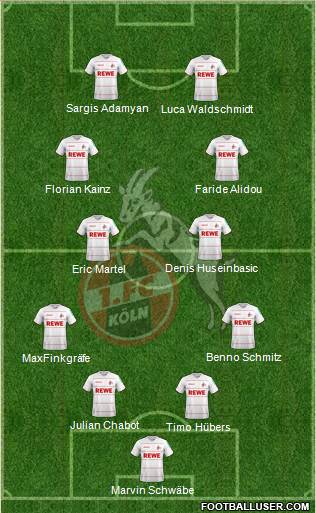
To be fair, Rani Khedira's vicious tackle on Luca Waldschmidt threw the proverbial wrench into Schultz's gears. Köln's Wolfsburg loanee hobbled around the pitch clearly hurt until it became totally clear that he couldn't continue. Before the man in charge of the cathedral city side could even begin to ponder "Plan B", Union scored two goals. Union themselves weren't terribly convincing and didn't rattle off an attack until near the quarter-of-an-hour mark. Robin Knoche - in for the injured Kevin Vogt - headed home the 1-0 in the 15th. A soft handball call two minutes later enabled die Eisernen to double the advantage.
How did the FCU trainer line up his team?
Back on the bench following Nenad Bjelica's sacking earlier in the week, Marco Grote made four changes to last week's XI. Knoche, Christopher Trimmel, Jerome Roussillon, Brenden Aaronson, replaced Vogt, Josip Juranovic, Lucas Tousart, and Benedict Hollerbach. The re-format from a 3-3-2-2 to a more ambitious 3-4-3 was most notable for placing Robin Gosens all the way up on the top attacking axis. Grote borrowed one of Bjelica's better ideas. Bjelica himself - as we've often noted - has merely been borrowing ideas from Urs Fischer all year.
Lineup—FCU—Match 33 (3-4-3)
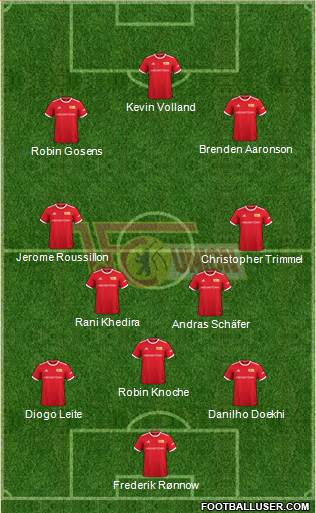
Schultz utilized Waldschmidt's injury to reset his own tactics shortly after the second goal. Faride Alidou moved up front while Florian Kainz and Linton Maina dropped back to the wings. Sargis Adamyan hung tight up top in a constellation that clearly threw four strikers forward. While there was some more structure to the play of the Domstädter, even much of a hint of attacking threat wasn't discernible. The first major tactical shift produced nothing. Signs of life from the trailing side didn't even begin to emerge. Granted an unexpected lifeline via another strange call, Schultz ditched this at the half.
Lineup—KOE—21st minute (4-2-4)
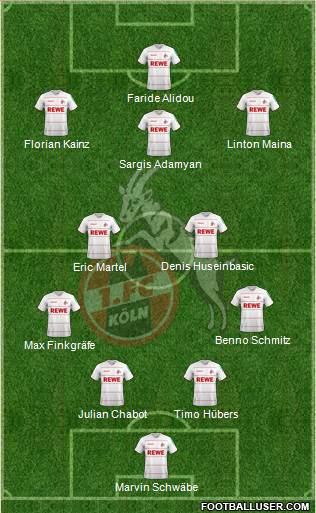
Schultz attempted to insert "Bock" into his "Geißböcke" by taking off Adamyan and Benno Schmitz in favor of Dominique Heintz and Steffen Tigges. This naturally healed a move forward for Max Finkgräfe. Linton Maina slid back to what was theoretically a useful pocket role behind Finkgräfe, The back-three - barely supported by solo-six Eric Martel spread out considerably. Union didn't receive much of a chance to exploit this as their own injury issue (Roussillon) prevented the guests from getting into much of a flow.
Lineup—KOE—46th minute (3-5-2)
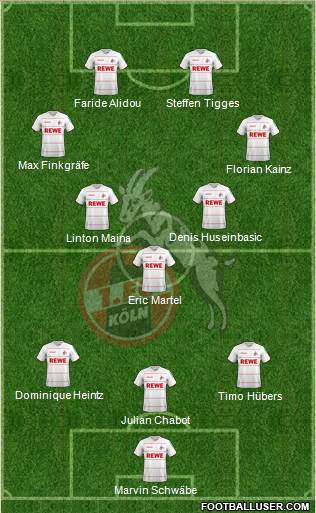
No "Bock" here. Neither compelling nor creative. Union, sometimes working in a back-six, closed down the center far too easily. Effective FCU counters nearly put this game to bed. Roussillon missed the best chance (thanks to a save from Marvin Schwäbe) shortly before being subbed off in the 60th. The French wingback's replacement, Lucas Tousart, moved back alongside Khedira's half-time replacement Janik Haberer. As Grote himself later put it in his post-match interview, the Kölner comeback came out of nowhere. Grote's Köpenickers appeared to have everything under control in this:
Lineup—FCU—61st minute (3-5-2)
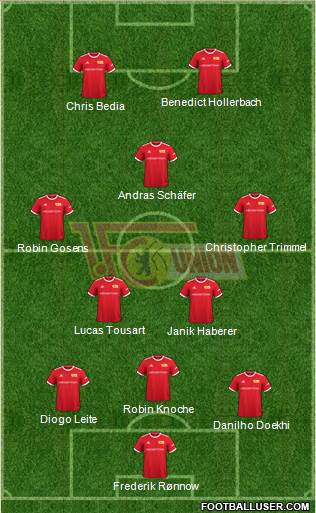
In addition to the Roussillon chance, Gosens also struck the crossbar before the last-minute Kölner comeback. Maina and Tigges furnished some really bad finishes before the unthinkable occurred. This truly looked like the end-of-the line for the hosts. Of the dozen plus shots on target Schultz's men had produced, nothing at all came close to appearing good enough for this level. Even when the equalizer arrived in the 87th, one doubted it would count. Tigges and Tim Hübers each flirted with an offside position. The 2-2 was allowed to stand only after a lengthy VAR check,
The final "free for all"
Much like last week's crazy result involving Union, strategy went out the window in the wild final minutes. The Kölner cavalry was on the pitch. Mark Uth replaced Schultz's lone remaining midfielder Martel already in the 61st. The team lorded over the liberty to push forward in whatever shape they wanted. Interestingly enough, the goal that would win the match came off a counter at 90+3 in which Union's Andras Schäfer supplied a soft finish on yet another chance for Union to throw a lid on this match. It came oh so close to swinging the other way.
Tigges' equalizer coming from a dead-ball, Köln scored the winner on their only decent approach of the entire afternoon. Everything simply went right for the new "comeback kings" of the Bundesliga. The most clairvoyant of mystics couldn't have tipped this result, in part because there is no such thing as a "clairvoyant mystic" within our species. No one's crania possesses special spiritual powers. Wow. That's about all one can say. An incredible result. Lovely scenes. No what the hell happens next?
"Bock auf die Geißböcke"?
Somewhat. In light of the fact that - as has too often been the case this season - debilitating injury news accompanied the latest Kölner victory, German football watchers fully expect the axe to fall. While the cathedral city side did draw Heidenheim in Schultz's first game in charge on the final match-day of the Hin-runde, a draw won't be anywhere near good enough this time. The league's 17th side must win big if they hope to overtake Union for the relegation playoff place. Goal differential matters here. This is not a goal-scoring team.
One thing Germans absolutely maintain "Bock" for is our 2. Bundesliga. Twice this season, attendance in the second division has surpassed that of the first. We have zero qualms about giving the "Unterhaus" preference over the "Oberhaus" these days. The fact that four non-50+1 clubs (and a total of seven with significant extra financial backing) are now established in the top flight merely means that we'll happily gravitate towards watching tradition-rich clubs with lower quality contest the lower league. In this sense, Köln's relegation isn't a tragedy at all.
Live fans and TV viewers alike won't leave them,
"Öde"
For a couple of weeks now, we've been discussing how Leverkusen's scarcely believable run to the scarcely conceivable perfect season suddenly leaves Germans with a lame taste in their mouth. One is almost embarrassed to broach this topic. Where do Bundesliga lovers find the gall to declare themselves bored with the historic end to 11-years-of Bayern dominance? Will nothing truly satisfy us? A decade of grousing about the Bundesliga being boring and now we turn right around and complain some more. Are us adult league lovers, in fact, moody teenagers after all?
Some defense of the German mind-set first. The columnist wishes to emphasize that much of the griping and grumbling this weekend stems from our general dissatisfaction with simultaneous kickoffs on the season's penultimate match-day being taken away from us. Making all the teams kick off concurrently not only enhances excitement and competition, but also gets the meaningless matches out of the way quickly so as not to stretch the weekend out with insignificant football. Leverkusen's 50th consecutive match undefeated across all competitions capped this round on Sunday night.
By that time, we were simply all exhausted to enjoy the "50 balloons" hoisted by Germany's red company team. A surfeit of genuinely bad and boring football over the weekend even caused many to tune out entirely and go enjoy the summer weather. Staggered kickoff times across the penultimate match-day simply doesn't sit right with us. We protest the whole notion live within the stadiums every week. All the staggering - combined with the race for Europe devolving into an awful eyesore of a "Schneckenrennen" - left us rolling out eyes and moaning "lame!"
How does one say "lame" in German? The adjective "lahm" can be used, but that more aptly applies to something that is inert. The word for "boring" ("langweilig") doesn't have the connotative power of "lame". Something that "bores" isn't quite the same as something that "bores", "frustrates", and "hurts" at the same time. The English word "lame" derives from "lahm", but the teenage slang overtones that British and American English peppered the word with leave Germans reaching for the new meanings that the word accrued. We say "lame!". We say it quite often.
It shouldn't take all that long for this word itself to become "uncool". As mentioned in the above section, the moody teenager in all of us strives to stay one step ahead of those we have no way of knowing actually know better than us. Might it soon be time for "Öde/öde" to make a comeback? The author did see/hear it a pair of times when perusing the coverage of this weekend's action. It's an almost perfectly contrived concept. Slap an umlaut on the word "ode" and suddenly one enters the drab, dreary, and barren wasteland of the tortured German soul. Now we're back in line with our heritage.
Indeed, "Öde/öde" brings one to the crushing loneliness of mind-numbing and soul-destroying nothingness. To describe something as "öde" is to define a level of boredom that bites into one's bones. To speak of "Öde" is to touch upon a vacuum of desolation so bleak that one fears ever finding color, light, and inspiration ever again. Yes, it's dark. Schopenhauer dark. Damn DFL staggered kickoff times! How can the beautiful game and the sacred Bundesliga be reduced to this? Thank goodness all the fixtures next weekend kick off at the same time!
How boring was a five-goal match?
Xabi Alonso did put forth an interesting idea. The Werkself trainer continues to take his team's prospects for achieving immortal glory seriously. Leverkusen's standard league 3-4-3 received its obligatory match-specific tweak against Bochum. One could nevertheless mostly infer how things would occasionally shake out upon the release of the team-sheet. Victor Boniface and Patrik Schick were naturally going to head forward on a two-pronged attack whilst Nathan Tella slid in underneath. We beheld this in several instances:
Lineup—B04—Match 33 (3-4-1-2)
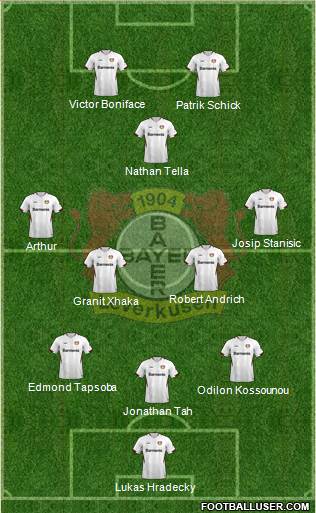
VfL trainer Heiko Butscher kept his 4-2-3-1 from last week in place. Captain Anthony Losilla returned from suspension to take the place of Matus Bero alongside Patrick Osterhage in the double six. Takuma Asano also replaced Moritz Broschinski on the right wing. By Bochum's own low standards, the start to the match from the hosting Revierklub wasn't bad. Kevin Stöger pulled the strings aptly enough from the ten slot. Lead striker Philipp Hofmann got one decent look at goal in. Then came Felix Passlack's 15th-minute red card.
Uh-oh.
Here comes the "Öde".
Lineup—BOC—21st minute (5-1-3)
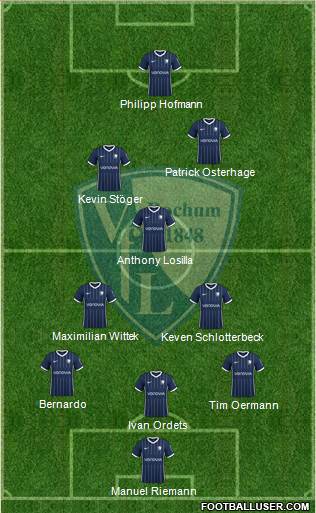
Butscher's initial re-format was mildly interesting as it did leave Bochum with some counterattacking potential up the middle. The interim trainer some of us saw fit to mock does have some tactical chops about him. The league champs encountered difficulty playing through this and didn't really get a quality effort on target until Granit Xhaka struck the crossbar at the half-hour mark. It was, sadly, still the case that Bochum's attacking play remained non-existent. No one watching entertained any doubt as to who would ultimately win the match.
Once Schick and Arthur opened up the scoring in the 41st, one could safely call this one. Match official Benjamin Brand, almost deliberately, appeared to wish to keep it competitive by allowing Keven Schlotterbeck's first foul on Tella in the box (43rd) to go unpunished. The ref couldn't ignore the second infraction at 45+1 and Boniface got a chance to sink the match-killing 2-0 from the spot at 45+2. Game over. All that was left was to see if Butscher conjured up something interesting for the second half.
Lineup—BOC—46th minute (4-3-2)
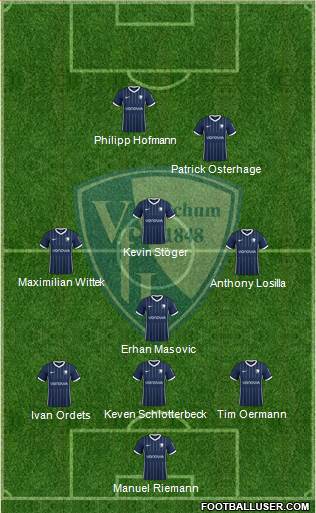
Sure. Good. The outfield arrangement, with some help from keeper Manuel Riemann and the goalpost, mitigated the damage for a while. Butscher's VfL demonstrated minimal enough competence to the point that one fears a rather boring conclusion to the 2023/24 Bundesliga relegation race. Can Bochum pick up the single needed point against Bremen next week? Probably. Results involving Mainz, Union, and Köln might lead to the four-team relegation field finishing in the precise order they now stand in the table.
One really hopes for some surprises here.
Otherwise, it's "Öde an die Freude".
Thanks so much for reading! You can catch the release of all Peter's columns (and occasionally catch him goofing off) on whatever the hell they're calling twitter these days @PeterVicey.
Twitter DMs are open for football conversations, corrections, and (if you truly insist) general abuse.
Full color re-posts of the columns are eventually archived on Peter's website.
